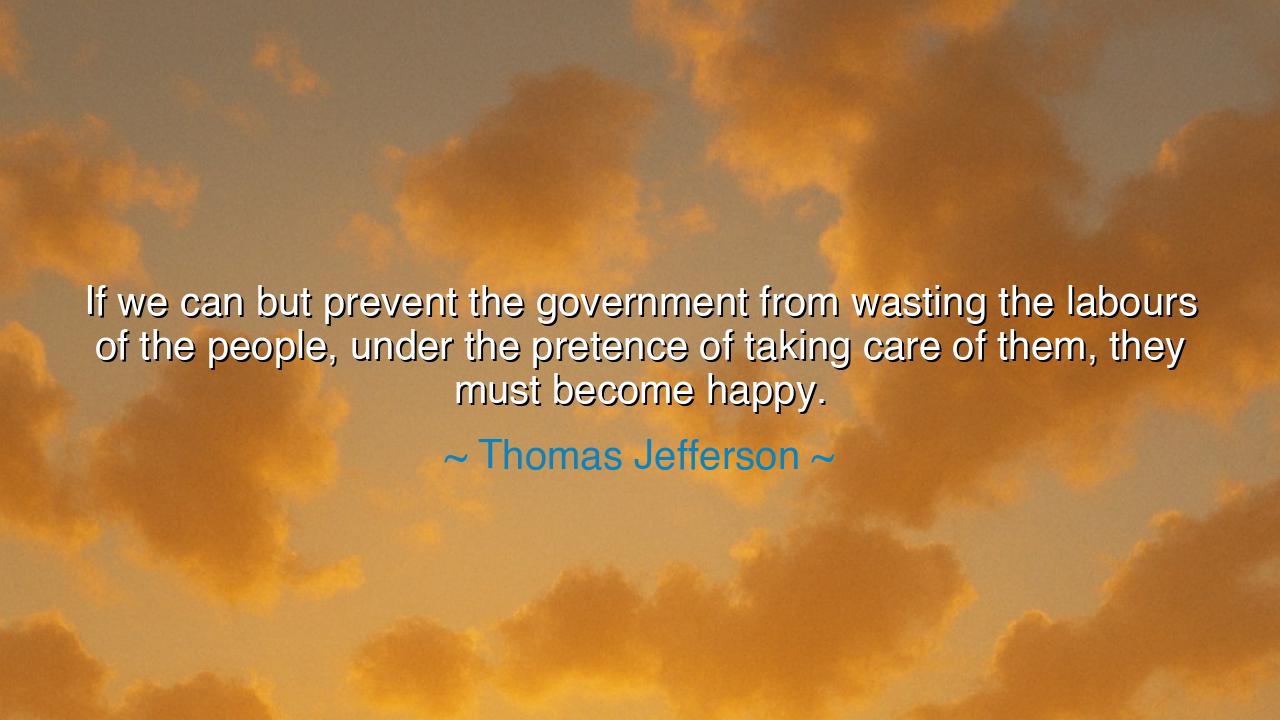
If we can but prevent the government from wasting the labours of
If we can but prevent the government from wasting the labours of the people, under the pretence of taking care of them, they must become happy.






In the golden dawn of a young republic, Thomas Jefferson, the sage of liberty and author of independence, spoke words that still burn with prophetic fire: “If we can but prevent the government from wasting the labours of the people, under the pretence of taking care of them, they must become happy.” These words, written not in cynicism but in eternal vigilance, reveal the heart of Jefferson’s philosophy — that the strength of a nation lies not in the wealth of its rulers, but in the freedom and prosperity of its citizens. He saw with piercing clarity that government, though necessary, carries within it the seed of waste and tyranny when it cloaks greed and control beneath the mask of benevolence.
The origin of this wisdom lies in the aftermath of revolution, when America stood trembling between liberty and dependence. Jefferson, having witnessed the burdens of monarchy and the oppression of distant taxation, knew well how rulers often claim to “care for the people” while draining their strength and labor. His vision was of a republic governed lightly, where the hand of the state guided but did not grip, where the fruits of a man’s work nourished his own family before feeding the coffers of bureaucracy. His warning was clear: when government pretends to be the guardian of happiness, it often becomes its thief.
Jefferson’s words are not a call to anarchy, but to wisdom — to the sacred balance between freedom and governance. He believed in the virtue of the citizen farmer, the craftsman, the thinker — those who, left to their own honest labor, could prosper and live with dignity. Yet he feared the rise of a government that would grow fat upon their toil, justifying its appetite by claiming to protect and provide. “Under the pretence of taking care of them,” he said — for the most dangerous tyrannies are those born not of cruelty, but of compassion. History has shown that the chains of welfare and control are often forged from the language of kindness.
Consider the example of France in the late 18th century. Before its revolution, the monarchy claimed to govern for the good of the people — taxing heavily, spending lavishly, and calling it “protection of the realm.” The peasants, crushed beneath the weight of royal waste, found their labor consumed not for their own happiness but for the pleasure of a distant elite. Bread was scarce, while palaces glittered. When the people rose, their fury was not only against the crown, but against the illusion that their suffering had been endured in the name of care. Jefferson, who watched these events unfold with both sympathy and sorrow, understood their lesson: that when rulers spend the labor of the people as if it were their own, destruction soon follows.
And yet, Jefferson’s wisdom speaks not only to kings and empires, but to all ages — even ours. The modern state, vast and complex, often stretches its hand farther than the founders ever dreamed. In the name of safety, it regulates; in the name of compassion, it taxes; in the name of order, it grows. Each new law, each new program, each new promise made “for the people” slowly binds those very people in invisible cords. The citizen forgets his power, the government forgets its limits, and prosperity gives way to dependency. Jefferson saw this danger not as theory, but as destiny — that a nation which forgets to guard its liberty will awaken one day to find it quietly spent.
Yet there is also hope in his words. Jefferson does not despair of government; he simply reminds us of its rightful place. If it can be restrained from wasting the labours of the people, if it can remain humble, transparent, and faithful to its duty, then the natural energy of free men and women will create happiness beyond measure. A wise state serves by stepping aside — by clearing the path, not paving it with chains. It defends the people’s right to labor, to innovate, to prosper, and in doing so, it strengthens the nation more than any law or decree ever could.
The lesson, then, is both simple and eternal: guard your liberty as fiercely as your livelihood, for the two are one and the same. Question those who claim to take care of you while taking from you. Demand accountability, demand restraint, and remember that every coin the government spends was earned by someone’s sweat. The true happiness of a people is not given by the state — it is built by their own hands, preserved by their own vigilance, and sanctified by their freedom.
So, my child of the republic, remember the voice of Jefferson — a voice that still speaks across centuries. Do not curse government, but keep it honest. Do not reject care, but ensure it is freely chosen. For when the government serves lightly and the people labor freely, the nation blooms in the sunlight of justice. But when the state grows heavy and the people grow weary beneath its weight, the garden of liberty begins to wither. Protect your labor, cherish your freedom, and you shall know the happiness Jefferson promised — the happiness that comes not from being ruled, but from being free.






AAdministratorAdministrator
Welcome, honored guests. Please leave a comment, we will respond soon